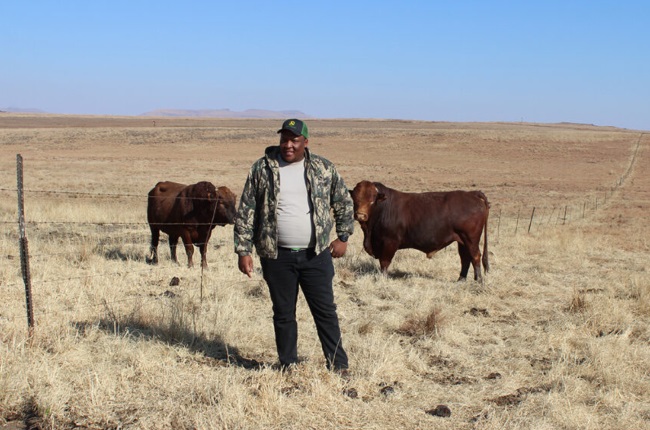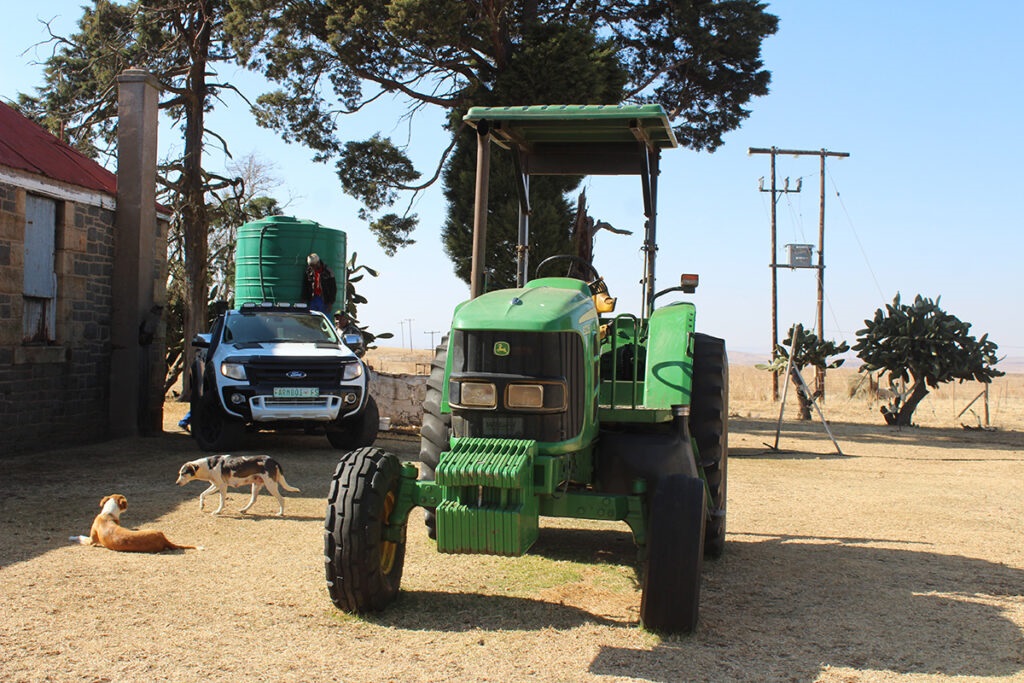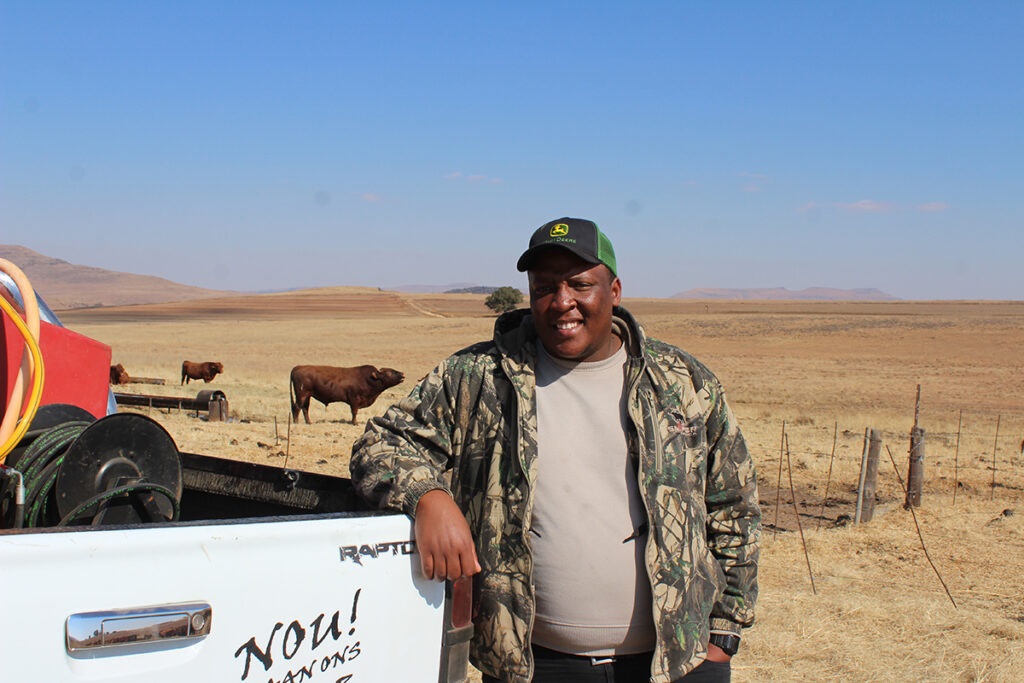
With the high cost of living and food, sometimes it's just easier to buy a whole sheep or goat, have it slaughtered and cut into its different parts, then freeze it so you have meat to feed your family and visitors for the coming year.
But when many of us started feeling the effects of the Covid-19 lockdown in 2020, saving money to buy a whole animal in December became harder.
Stokvels have for many years been the best savings vehicle for many communities, however. So young farmer Nkosana Mtambo decided to use this vehicle to help struggling communities.
“I introduced a livestock stokvel model to my clients.
“It was a big event when we delivered the sheep in December. People were so impressed that we grew to more than 500 members. We had to cut off the registrations to avoid overstretching ourselves.”
Read more | Here’s how John Deere can help farmers with their finances
When Nkosana Mtambo woke up on his 21st birthday eight years ago, little did he know that it was a day that would change his life.
His father and grandfather gave him 710ha of farmland as a gift for his 21st birthday.
This would become the foundation of Mtambo Boerdery, an operation consisting of 200 Bonsmara cattle, 400 Dohne merinos, and a fleet of tractors over three farms.
Nkosana was introduced to the world of business and farming at the age of three by his father, Jabu Mtambo, a successful entrepreneur in the Vaal triangle, and his late grandfather, Samuel Mtambo, who farmed livestock in Frankfort.
“My grandfather farmed on a family farm in Frankfort and owned a small plot in Three Rivers near the Vaal, where I grew up,” Nkosana tells African Farming.
“My dad owned a few retail shops, including butcheries in Boipatong and Evaton.”
This early exposure played a role in Nkosana’s career and his ability to build a successful business with an annual turnover of more than R15 million in less than six years. Mtambo Boerdery was established in 2014 when Jabu and Samuel gave Nkosana a 710ha farm in Vrede as a 21st-birthday gift.
Today he grows maize and beans on 200ha and runs a 200-cow breeding herd of Bonsmaras and400 Dohne merinos on three farms totalling 2 000ha. “I went to live with my grandparents when I was three years old,” says Nkosana. He was always with his grandpa, checking on cattle, grass, fences and water points.
Once older and in school, he helped his dad in the shops on weekends. After matric, Nkosana took over his dad’s butchery and shisa nyama in Evaton.”This is where my understanding of the red-meat value chain started,” he says.
Nkosana enlisted his grandfather as a redmeat supplier when he realised a lot of money was spent on sourcing their meat supply. But the demand was too great for Samuel to meet. “I grabbed the opportunity to start speculating. I bought livestock at auctions, kept what we needed for the butcheries and sold the rest in the township for funerals, weddings and parties,” says Nkosana.
This soon became a full-time job, so he left the butchery to focus on the livestock business. A year later he was turning over about R80 000 a week and growing. “I quickly ran out of space on the plot,” Nkosana says. The next step was to find more land where he could start breeding his own cattle. He discussed this plan with Samuel and Jabu.
“I kept hitting brick walls trying to find land,” he adds. In the meantime, while his own plans were delayed, he went back to helping Samuel and Jabu in their businesses. “I was with my grandfather on the farm on Tuesdays, on Wednesdays I was at the auctions buying livestock, Thursdays I was preparing and sorting orders for deliveries on Friday,” Nkosana says. “Over the weekend I was busy at the shisa nyama, and Mondays I would rest.”
But his commitment wasn’t going unnoticed: on his 21st birthday in July 2014, he drove out to Vrede with Jabu and Samuel to look at a property they said they wanted to buy. When they arrived, they handed him the keys.
The farm had been paid for in cash and all the paperwork was done.
“It was surreal,” Nkosana recalls.
“I was excited and intimidated at the same time. It meant I had to leave my comfort zone and move to a farm so far from home.”
Nkosana, his two cousins and two friends soon began to fix up the old house and the fences.
“There was no electricity, so we brought candles and slept on the floor,” he says.
But he needed a cash injection to get the farm started and his livestock-speculation business was suffering, as he was spending more time on the farm. His father threw Nkosana a lifeline by buying him 24 pregnant cows.
The previous owner had grown maize on the farm’s 200ha of arable land, so Nkosana decided he’d use the land for cropping to boost cash flow. Without any implements, he planted 5ha of Hubbard squash and cabbage by hand.
“We managed to get a dryland yield of 300 head of cabbage,” he says.
“My dad and grandfather were quite impressed.”
He used some of the money from the sale of his produce to buy sheep in 2015. In 2016 Nkosana was offered a bursary by the Free State Department of Agriculture and Rural Development to study agro-processing in Indonesia.
“I thought it was a great opportunity so I accepted and arrived in Jakarta in January,” he says. But three weeks into the course Nkosana packed his bags and headed home. “I had a farm and I had spent time and effort developing it. Leaving it for another three years was just not part of my vision.”
Read more | She took over her husband’s panel beating business, added towing services, grew it and diversified
Back home, Nkosana approached the department for the necessary funding to plant his 200ha.
His application wasn’t successful, so he leased the land to a local grain farmer and sold some of his weaners to buy a second-hand Massey Ferguson 268 tractor. With Samuel’s help, he bought a ripper and a disc plough. Then he took up speculating again in order to buy more animals.
“My knowledge of cattle was limited, and I was chasing numbers rather than quality. I bought anything I could lay my hands-on,” he says.
By the end of 2017, he had 500 head of cattle.
When Nkosana bought his tractor, he recruited Ntate Tsotetsi, recently retired after many years of working on a local commercial farm, to operate it.
Ntate Tsotetsi convinced him to start farming Bonsmaras, as many of his animals were not worth much.
“At first I thought I knew better, but pretty soon I realised Ntate Tsotetsi was right. My cattle never fetched anything over R5 000. Other breeds, especially the Bonsmaras, always sold for more than R8 000.”
That year he sold his cattle and started building a Bonsmara herd. Nkosana also raised part of the capital he needed to start planting.
“Including the rental money, I had a little more than R500 000. My dad chipped in so that I could plant 100ha to maize,” he recalls.
In the 2017/2018 planting season, Nkosana planted his first maize crop on 80ha.
“I‘d done my research and been advised by seed company agents. We did it all by the book, but that year [2017] we were hit by a drought and suffered a huge loss.”
He took it badly and told his father and grandpa that he was giving up. But Jabu and Samuel would not hear of this.
With renewed determination and the crop season behind him, Nkosana wasn’t leaving anything to chance. “If I was going to make it in this industry, I needed to align myself with the right people.”
He approached the Sernick Group for help and was admitted to its Emerging Farmers Programme. He began to attend training at Sernick, starting from Tier 1 and receiving a Seta-accredited certificate for livestock management.
On Tier 2, he says, farmers are equipped with technical skills to help them develop their herds and their financial skills. “
In 2020 I was in Tier 3 and I received 35 cows and a bull, funded by the Jobs Fund Programme.”
“Since we have acquired two more farms, we have enough grazing and hardly have to feed extra, except for licks from Sernick. We also follow a strict vaccination protocol that we worked out with the vet from the programme.”
In the 2019/20 planting season, Nkosana again asked the department for financial help with planting. When he went to apply, he ran into the MEC, Oupa Khoabane, who was so impressed with his story that he visited the farm.
“He brought along officials who assessed the farm and helped me through the Casp [Comprehensive Agricultural Support Programme] application process,” says Nkosana.
Mtambo Boerdery was approved for R1 million of funding to plant in 2019. Nkosana brought in a commercial contractor who managed to stretch the budget to cover 120ha.
Unaware of the funding raised through Casp, Jabu and Samuel had also managed to raise some funds for Nkosana to plant.
“I used this money to buy another Massey Ferguson tractor and a John Deere planter,” he recalls. The 2019/20 season crop turned out to be a success.
“I got 5.1t/ha and was quite chuffed. Sadly, my grandfather passed away soon after.”
With the proceeds of that harvest, he invested in mechanisation. His fleet now includes two Massey Fergusons, two John Deere 6 Series tractors and two John Deere planters.
Watch Nkosana's story:
- Missed our latest Careers newsletter?
Click here to read it for free. In this issue, we focus on farming, internships and scholarships you can apply for in November 2022, including the Gauteng Department of Agriculture and Rural Development (GDARD).
Subscribe to the fortnightly DRUM Careers newsletter here.






















